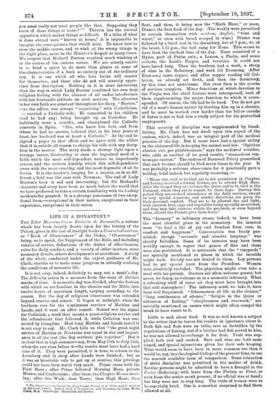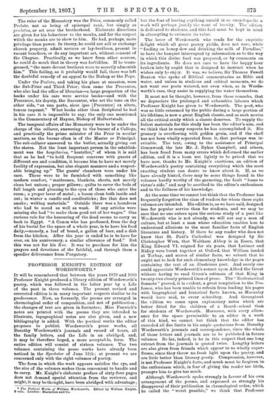LIFE IN A MONASTERY.*
THE Liter Memorandorain Eeclesiae de Bernewelle, a volume which has been largely drawn upon for the history of the Priory, gives in the last of its eight books a Consuetudinarium, or "Book of Observances" of the Order, " Observances " being, so to speak, the Supplement of the Rule, and including rubrics of service, definitions of the duties of office-bearers, rules for daily conduct, and a variety of other matters, some necessary details, others developments or accretions. A study of the whole, conducted under the expert guidance of Mr. 'Clark, enables us to make some progress in actually realising the conditions of monastic life.
It is not easy, indeed, definitely to map out a monk's day. The difficulty arises in a measure from the want of distinct marks of time. A monastic day was divided, after the fashion with which we are familiar in the classics and the Bible, into twelve hours of uncertain length, varying according to the season. But the day of religious observance was extended beyond sunrise and sunset. It began at midnight, when the brethren rose for the continuous services of Mattins and Lands, and it went on after sunset. Sunset was the signal for Collation, a word that means a quasi-religious service and the refreshment that followed it, while Collation was suc- ceeded by Compline. How long Mattins and Lands lasted it is not easy to say. Mr. Clark tells us that "the great night service of Mattins or Nocturna was equal in size and import- ance to all the rest (the day services) put together." But it is clear that in high summer—say, from May 15th to July 15th, when the sun rises before 4—the monks must have had a hard time of it. They were permitted, it is true, to return to the dormitory and to sleep after Lands were finished ; but as it was an invariable rule to get up at sunrise, this privilege -could not have been worth very much. Prime came with the First Hour ; after Prime followed Morning Mass, private Masses, and Confessions ; after these the Chapter House meet- ing; after this Work; then Terce ; then High Mass; then • The Ohsereanees in Use at the Auyttetinian Priory of S. Giles and S. Andrew at Barnwell. Cambs. Edited, with a Tr.anslation and Glossary, by John Clark. M.A. Cambridge Macmillan and Bowes.
Seat, and then, it being now the "Sixth Hour," or noon, Dinner, the first food of the day. (The weakly were permitted
to sustain themselves with mixtum, Anglice, "wine and water," or even with bread steeped in wine.) Dinner was followed by a brief rest in the dormitory, but at 1 p.m., or, at the latest, 1.15 p.m., the bell rang for None. This seems to have been the slackest time of the day. None consisted of a Hymn, part of Psalm cxix., a Lesson, a Psalm, and some collects, the Lord's Prayer, and versicles. It. could not have lasted long. Then the brethren had a wash, a stoup of wine in the Refectory, and work till Evensong. After Even song came supper, and after supper reading till Col- lation, as already set forth, and then the dormitory, by this time not unwelcome. Not even then is the course of services complete. Minor functions at which devotion to the Virgin was the chief feature were interspersed, each of them supplementing the major function to which it corre-
sponded. Of course, the life had to be hard. You do not get rid of a man's human nature by shutting him up in a cloister, and he must be worked even harder than his fellow outside if Satan is not to find him a ready subject for his proverbial employment.
This severity of discipline was supplemented by blood- letting. Mr. Clark does not dwell upon this aspect of the custom, which, indeed, was an integral part of the medical practice of the day. But it must have had a special utility in the cloistered life in keeping the animal soul low. "Spiritus uberior exit per phlebotomiam," says the medieval versifier, who adds as another of its good results, " stomachum ven- tremque coercet." The custom of Barnwell Priory prescribed that each brother should be bled seven times in the year. It was probably a welcome observance, for it practically gave a holiday, brief indeed, but regularly recurring :—
"Those who wish to be bled are to ask permission in Chapter, and having received a formal license, are to attend High Mass. After the Gospel they are to leave the Quire and to be bled in the Farmery, where they are to remain for three days. During this period they are excused attendance at the daily services, except on very special occasions, and minute directions are given for their personal comfort. They are to be allowed fire and light, with suitable food, eggs and vegetables being specially mentioned, and they may take exercise within the precincts, or even beyond them, should the Prelate give them leave."
The " farmery " or infirmary seems, indeed, to have been the most cheerful place in the monastery. Its inmates were "to lead a life of joy and freedom from care, in comfort and happiness." Conversation was freely per- mitted, though "sarcastic and abusive language" was
strictly forbidden. Some of its inmates may have been worldly enough to regret that games of dice and chess were also prohibited. It is noticeable that the " vineyards " are specially mentioned as places in which the invalids might walk. Society was not denied to them. Lay persons had to get special leave from the President. Women
were absolutely excluded. The physician might even take a meal with his patient. Doctors are often welcome guests, but never, we fancy, so welcome as in a monastic infirmary. What a refreshing whiff of outer air they must have brought into that still atmosphere ! The infirmary must, we take it, have
been well frequented. "Irksomeness of life in the cloister," "long continuance of silence," "fatigue in the Quire or extension of fasting," "sleeplessness and overwork," are specially mentioned as causes which might often compel the monk to have resort to it.
Little is said about food. It was so well known a subject to the writer that he leaves his readers in ignorance about it.
Both fish and flesh were on table, save as forbidden by the regulations of fasting, but if a brother had fish served to him, he was not allowed to exchange it for flesh. Fruit was sup- plied, both raw and cooked. Beer and wine are both men- tioned, and special injunctions given for their safe keeping. Wine would seem to have been in more common use than it would be, say, in a theological College of the present time, to use the nearest available term of comparison. Some relaxation of strict discipline was permitted in the matter of drink. Secular persons might be admitted to have a draught in the Frater (Refectory) with leave from the Prelate or Prior, or even from the senior monk present, if no official was at hand ; but they were not to stay long. The visits of women were to be especially brief. One is somewhat surprised to find them allowed at all.
The ruler of the Monastery was the Prior, commonly called Prelate, not as being of episcopal rank, but simply as praiatus, or set over the brotherhood. Elaborate directions are given for his behaviour to the monks, and for the respect which the monks are to show to him. He had, perhaps, more privilege than power. In theory, he could not sell or exchange church property, admit novices or lay-brethren, present to vacant benefices, or do any important act, without consent of the Chapter. Practically, as we know from other sources, he could do much that in theory was forbidden. If he trans- gressed, "the more devout brethren were to secretly admonish him." This failing, as it probably would fail, there was left the doubtful remedy of an appeal to the Bishop or the Pope.
-Under the Prelate, and taking his place at occasion, were the Sub-Prior and Third Prior; then came the Precentor, who also had the office of librarian—a large proportion of the books under his care were service books—and with the Precentor, his deputy, the Succentor, who set the tone on the other side, "ex una parte, icut ipse [Precentor] ex altem, tonum imponet." What books other than Scriptural he had in his care it is impossible to say; the only one mentioned is the Commentary of Haymo, Bishop of Halbertstadt.
The temporal affairs of the Monastery were to be under the charge of the cellarer, answering to the bursar of a College, and practically the prime minister of the Prior in secular matters, as the bursar often is of the Master or Principal. The sub-cellarer answered to the butler, actually giving out the stores. Not the least important person in the establish- ment was the hospitarius, "hosteller," of whom it is said that as he had "to hold frequent converse with guests of different sex and condition, it became him to have not merely facility of expression, but also elegant manners and a respect- able bringing up." The guests' chambers were under his care. These were to be furnished with something like modern comfort, "mattresses, blankets, sheets, not merely clean but untorn ; proper pillows; quilts to cover the beds of full length and pleasing to the eyes of those who enter the room ; a proper laver of metal ; a bason clean both inside and out; in winter a candle and candlesticks ; fire that does not smoke ; writing materials." Outside there was a laundress who had to mend as well as wash. If any articles were missing she had "to make them good out of her wages." One Curious rule for the honouring of the dead seems to carry us back to Egypt. "A Canon who has professed, from the day of his burial for the space of a whole year, is to have his food daily,—namely, a loaf of bread, a gallon of beer, and a dish from the kitchen. After the year is ended he is to have for ever, on his anniversary, a similar allowance of food." But this was not for his Ear. It was to purchase for him the prayers and devotions of the faithful, and through them a speedier deliverance from Purgatory.



































 Previous page
Previous page